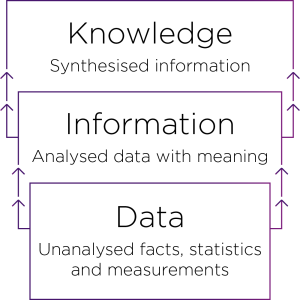1. What is information?
Information is all around us, but what does the word actually mean? Historically, there have been lots of different definitions of information. The Oxford English Dictionary defines information as ‘the imparting of knowledge in general’. However, this doesn’t actually tell us what information is.
 At the bottom of the hierarchy is data. Data are measurements, statistics and facts that when grouped together can be analysed for meaning. To learn more about data and how to use it, see our Work with data and files module.
At the bottom of the hierarchy is data. Data are measurements, statistics and facts that when grouped together can be analysed for meaning. To learn more about data and how to use it, see our Work with data and files module.
Information is the meaning that we get from this data. So for example, if we had a list of the number of ibises on campus from 2008 to 2018, our data would be a list of numbers. If we analyse that data, we can draw meaning out of it to create information. In this example, we could find out whether the number of ibises remained the same, or became larger or smaller.
Knowledge is synthesised information. This means that it is personal to us – our brains store information and use it to make judgements about the world. For example, if we know that the number of ibises has increased on campus, we might be less likely to eat our lunch outside in case an ibis steals our sandwich.
 Check your knowledge
Check your knowledge
When we write assignments, we use lots of different types of information to inform our work. This module will help you to identify the different types of information you might use, show you how to find information, and give you a framework for working out whether your information is good or bad.

